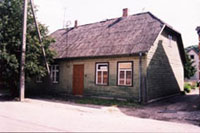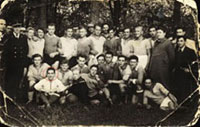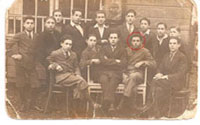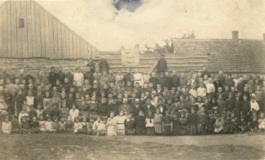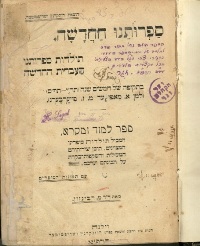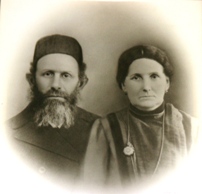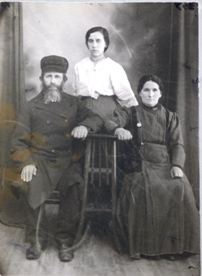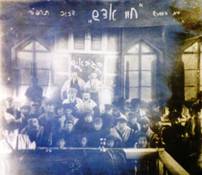Neil Kaplan
China
My grandfather, born 1898, came from Žagarė and we have some information, not a lot, but stories my dad and aunt heard from him when they were small. My grandfather's father owned an old mill, making wheat and baking bread. Some of the stories go that when my granddad was a young boy, he would go and hand out free bread and challa on Friday mornings to the needy. That's one story I recall being told to me by my aunt, early 20th century. He immigrated to South Africa, age 13, in 1911.
Barry Posner
Manchester, England
Against a background of economic and social oppression danger and brutality in the village of Žagarė in northern Lithuania a young Jewish couple were married.
The young bridegroom was my maternal grandfather Solomon Myer Laserson; his 17 year-old bride was Tirza Bassa or Teresa Bertha the daughter of Barnet (Solomon) and Eta Bera-Zava. Faint impressions remain of Barnet and Eta but of their children, Tirza Bassa's brothers and sisters Jack, Harry, Feiga, Hyman, Sarah and John we know a lot.
Very shortly afterwards in the early 1880s Solomon Myer left for England, with two or three male friends probably through the Latvian port of Riga. Žagarė was very close to the Latvian frontier and this would have been the shortest route to a sea port. He landed in England probably at a northern port, Hull or Middlesboro and made his way to Manchester. Later Tirza joined him in Manchester bringing over her parents.
Solomon Laserson by 1901 was well-connected and living in Manchester and very well off. He and Tirza had several children: sons Abraham and Maurice, and daughters Annie, Marie and Ruby; and later: Helena and Gerald. Solomon helped many people across from Russia around this time and earlier he assisted my father's father (totally co-incidentally) round about 1890 via Manchester to Liverpool and Philadelphia!
Joseph Posner born in Philadelphia would one day qualify in
medicine in Dublin, take up a position in Manchester and meet
and marry Helena, Tirza's youngest daughter (and become my
parents).
Mike Cave
Darlington, England
My great grandmother Zipa Lea (daughter of Kopel ber Wagenheim) was born in Žagarė as shown on the certificate from the Latvian archives. She married Abram Aron Goldwasser (son of David Goldwasser) in Riga 1877. Their son Leib Goldwaser (as shown on the certificate from Latvia) was born in 1879; he later used the name Louis Goldwater in UK and subsequently the surname Lawrence. They emigrated from Riga in the 1880s and settled in Leeds and then moved to Glasgow, where Leib/Lewis worked as a variety agent and where his daughter, my mother, Betty Cave, nee Lawrence was born.
Research document from the State Historial Archives of Lithunia.
Mark Gordon
New Jersey
A legend in my family states that a relative deserted from Napoleon's army in Lithuania. He became a synagogue sexton (caretaker) and took his surname of SCHULDIENER (Schuldiner, Shuldiner) from his new occupation.
This branch of my family lived in Žagarė, Lithuania in the 19th Century. David Schuldiener, born in 1792 as the oldest son of Yankel, may have been the relative described in the legend. David is my great-great-great grandfather. His daughter (Chana) Taube, born in 1825, married Leib Kaplan of Šiauliai, Lithuania. They moved to Riga, Latvia and later emigrated to New York City where they both died in 1909.
David Schuldiener is documented in the 1834 and 1858 Revision Lists (census records) for Žagar? located in the Lithuanian Archives. However, consistent with the legend about Napoleon's army, David is not shown in the 1795 Revision List for Žagar?.
Mark W. Gordon
Maplewood, NJ, USA
phone: 1 973 275-1500
fax: 1 973 275-0004
Samuel Lurie
Israel
My name is Samuel Lurie and I am a Professor of Obstetrics & Gynecology and I live in Rehovot, Israel.
My family (Lurie) lived in Žagarė on Vilnus street number 44 (fig 1). I do not know when they came to Žagarė.
My Grandfather, Shmuel Lurie (fig 2), was born around 1880 and was a Shoiceht (butcher). He was married to Malka Tankel (fig 3) born after 1881, daughter to Shia Tankel (1848-1930?) and Reisa Intiligator (1852-1930?), who also lived in Žagarė. After the Nazis had occupied Žagarė in 1941, they were hiding for about two years until they were exposed and shot.
Shmuel and Malka Lurie had 16 children, some of the names I do not know. Except for 4, the rest died at Holocaust, most on October, 1941 in Narishkin Park. Nosan (male), Nota (male), Asher (male), Sheva (female), Sara (female), Chaike (female) and Zvia (female) and their families were martyred. I do have a picture of aunts taken around 1930 (fig 4), though I can not identify their names. The ones who survived are: Tzila (female) who went to Montevideo, Uruguay around 1920; Yitzchak (male) who married with Chaia Sarah Matroz in Žagarė and went to South Africa around 1930; Oscar (male) who also went to South Africa around 1930; and my father Zalman.
My father Zalman Lurie was born in Žagarė on September 19, 1915. He was a member of Betar movement as can be seen in a picture taken on January 19, 1927 (fig 5) and played soccer for some local team (fig 6) and served in the Lithuanian Army as can be seen in picture taken in 1933 (fig 7). Shortly after the Nazi invasion of Soviet Union, my father escaped to Russia where he was mobilized to the Red Army and combated in the 16th Lithuanian Brigade. He was wounded 11 times. After the war he came back to Žagarė, just to find out that all his family was martyred. He left to Riga, from where he immigrated to Israel in 1971, where he passed in 1983.
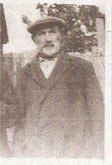 |
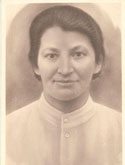 |
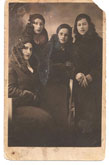 |
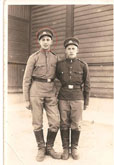 |
Cliff Marks
Vashon Island, Washington State
My grandfather, Isadore Gordon, was born in or near Žagarė in 1878. In a journal begun in 1948 (and never finished) he wrote the following:
"Father was a descendant from the Gordons on his father's
side and from the Yaffes on his mother's side hailing from
Zagger and Sadi. His father Meir came from an old branched out
family, in Sad, boasting of a line of known merchants, Rabbis,
and scribes. Father's grandfather Rabb Elasar, a merchant of
good standing and a Talmudic scholar. Was quite famous, all
around the neighboring communities. Grandfather Reb Mair as a
young Talmudist married Racher the daughter of Reb Isaac Yaffe
(after whom I am named) from New Tzagger (the town of Zagger
being divided by the river Sveta made up two townships New
Zagger and Old Zager.) who was quite rich at one time and
known for his wit and wisdom. But in spite of himself being
wealthy and belonging to the pedigreed and influential family
of the Jaffees, in community affairs he always took the side
of the poor. He was known as the champion of the under-dog.
Consequently he raised the wrath of the powerful and wealthy
and at the end suffered for it."
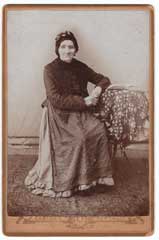 |
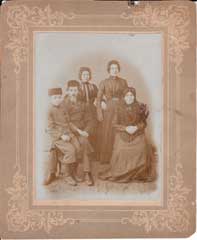 |
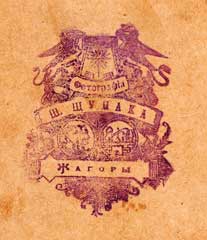 |
The woman in the photo on the left is my great-grandmother Feige Gordon (my grandfather Isadore's mother). The other picture is a bit of a mystery - I think the woman is also Feige Gordon and I am pretty sure that the young woman standing up on the left is her daughter Rose (my grandfather's sister). Is the older man my grandfather's father, then? And is the little boy on his lap my grandfather or one of his brothers? But the other woman standing behind Feige is a real mystery because I don't believe that there were other girls in the family, other than Rose. Below is the reverse of the photos that says they were taken in Zagare.
"Grandpa Towb" by Joy Hall
Cumbria, England
From Grandpa Towb (Myths and Realities) to LithuaniaLink
Grandpa Towb came from Žagarė, via the frozen Baltic Sea, on a sledge. He escaped the call up from the Tzarist army, where he would have: a) been sent to the front (because he was Jewish) and b) remained there for 25 years, had he survived (again because he was Jewish). He most likely walked up the road to Jelgava and sailed from there.
His original name may have been Friedlander or Israelovitch. His youngest son, my father Louis Towb, always spoke of "Zager" (with a hard Z) - "a beautiful place". "The ideal." He took such pride in talking about the town, though he never visited it. Nor did he know where Courland was or had been) or indeed, Lithuania! But his father, David (Grandpa Towb), must have been so fond if it, and talked to his son.
Lithuanian fruit liqueurs were imported to the quayside at Newcastle, where he, David Towb, subsequently lived, which he collected from there, no doubt enjoying them very much. Although Žagarės, the cherry liqueur, is no longer made in Žagarė any longer, it is at least made and is available, and how delicious it is!
I didn't, alas, know my grandpa (he died before the 2nd world war, and I was born in 1944), but various stories have been passed down the family.
At dinner, surrounded by his children and grandchildren, sitting at the head of the table, following a soup course (chicken?), he would seriously address his family, saying "now my children, you must never do this!" slowly lifting the plate to his lips in order not to waste any of the juices.
In Antwerp he became a diamond merchant for a very short time - sitting at his little table, with a smile pile of diamonds, along with numbers of other dealers, when the lights suddenly went out. When they came on again, all the diamonds had gone!
He had married Bassa Mueller (from Šiauliai/Shavel) and had 7 (or 8?) children. The siblings travelled all over the world, settling in the USA, South Africa, France (Paris), Antwerp and the UK (Gateshead/Newcastle). He travelled, we know, seeking work, though he was a gentle man, loving and fun - not wily or cunning.
Bassa died 3 weeks after the birth of Louis (my father), who was brought up by his sisters, some of whom I remember with great affection (Beck, Leah, Massie). Becky particularly was a great cook! Nothing was ever measured - all done by eye or hand (it's the way I like to cook now).
It must have been so hard, bringing up a family in Newcastle, as a refugee. His first words in English were "please buy!" - he was a selling goods from a tray. We also know he was also a picture framer in Swansea!
His children remembered him so fondly - there was always laughter and fun. The family was very close. I remember Friday nights and Pesach, particularly (long after Louis, my father had died). Always laughter and more laughter.
With these romantic and loving images in my head, I went with my sister to Žagarė in 1995 to see what we could see. Alas, a depressed town, with a vastly reduced and aging population, desperate to "become part of the west". One Jewish gentleman remained -Aizikas Mendelsonas - who was away fighting with the Russians when the massacre in the town took place. He adores seeing the visitors who now come - he's a national/international figure - a survivor, if ever there was one.
Lithuania Link
So it was that a group of friends in Cumbria (far north west
of England - near the Lake District) were enthused by me to do
something for the folk still living there. Many, many
adventures, self-help projects and friendships later, we can
look back and feel the efforts and fundraising were
worthwhile. These small projects included the planting of
cherry trees, installation of smoke alarms in the orphanage
(formerly the Naryshkin Palace), study trips to the UK,
environmental & educational projects. The charity,
Lithuania Link (UK registered charity 1091831) has now been
wound up - we don't have a "man on the ground" any longer, the
group of Cumbrian friends who were Lithuania Link's Executive
Committee are getting older (some have died), EU money is
available in Lithuania now; most of the young people migrate
to the big cities or have come to the UK or Ireland to work
etc., etc. Things have changed & moved on, but the values
and aspirations of Lithuania Link remain with the people of
Žagarė.
Addendum from Joy's cousin Harry Towb:
Grandpa Towb ran a hotel in Antwerp in the early part of the
20th century, till 1909 when the family returned to Gateshead.
It was called 'The Prince of Wales' [Louis remembered it as
Hotel Friedlander] and leased by the Red Star shipping line.
It catered for European emigrants heading to Ellis Island and
the 'Golden Medina'.
I met him (David) only once - in 1936 when I was 11. He wore
an imperial beard and (it seemed to me) a forbidding manner.
He had quite a presence - a genuine paterfamilias. The 'boys'
- Willie and Louis had great respect for him.
I was in awe of his charisma and can remember only one
conversation. He asked me what I liked listening to on the
wireless and I replied Bing Crosby, who at that time had a No
1 hit titled 'My Kid's A Crooner'.
Grandpa didn't actually explode but it was a close-run thing!
'Is that the man who goes "Boo-boop-a-doo?" I nodded.
'Rubbish' he said. 'It's absolute trash'.
Considering he was in the scrap business, this seems an appropriate opinion!
Aron Segal
Australia
My father Harry (Hirsh/Zvi) Segal was
born in Zagare in 1909 as were his siblings Isaac (~ 1907)
and Malka (~ 1905).His parents were Moshe (died ~1914) and
Leya ne Zusman.My father migrated to Melbourne, Australia in
1929 where he had an uncle (Henry Zusman) and a 2nd or 3rd
cousin (Sol Segal). His brother Isaac arrived in
Melbourne a couple of years earlier and they brought out
Leya and Malka in ~ 1935. According
to my father, who died in 1988, his father Moshe was
the son of Shlomo and Yochevet and had the following
siblings: Yehuda, Avraham, Rachel, and
Ita. My father’s mother, Leya, was the daughter
of Isaac and Malka and had the following siblings:
Hirsh (possibly Henry?), Hanna, Bezalel, Abba, Chanan,
Anna, Joseph and Doba.
In the photo below my father is in the top row from left in white. The school was a Jewish primary school called Zagare Folk School which was a school for children up to the age of 14. I believe that the sign in Hebrew says The Zagare Folk School.In the photograph my father looks like a 11 or 12 year old so the photograph may have been taken around 1920.
|
|
This is my father’s school prize. According to the Hebrew inscription, he was awarded the prize for being the top student in the school. The actual date can be determined by the Hebrew date which looks like רשפא but it is not that clear. If he won the prize for top student,and if he was 14 years old, the year would be 1923.
|
|
My father went on to study at the Ponevitz Hebrew Gymnasia.This is a photograph of his graduating class in 1927. He is in the 2nd row, far right. His lifelong friend from Zagare, Shmuel Goldstein, (right end of 2nd row from the bottom), also ended up in Australia.
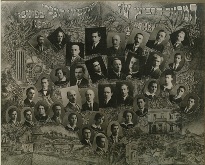 |
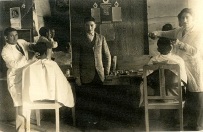 |
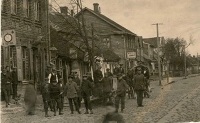 |
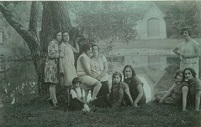 |
||
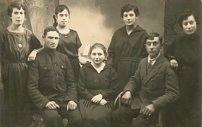 |
||
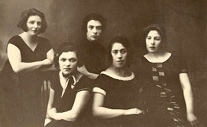 |
||
Lisa Cohn
Wayne, New Jersey
Here are two photos, taken in Zagare, of Leib and Hinda Rubin who were my great-great grandparents. I don’t know the name of the daughter in the second photo. The other photo was taken inside the shul in Zagare. The writing at the top right says “Beit Hamidrash” (synagogue, or the house of study). The words top center “Chai Aidash,” which was the name of the synagogue. Next to that is the word, L’Zagare (of Zagare). Top left is the date, 1924 or 1925. The Hebrew writing over their heads, says “Ha Gabayim.” The shorter man, with the beard, directly under the writing is Leib Rubin. The other’s name is Peretz.
FROM ZHOGGER TO CORK
An Irish story by Larry Elyan
Click here
to read this account.
